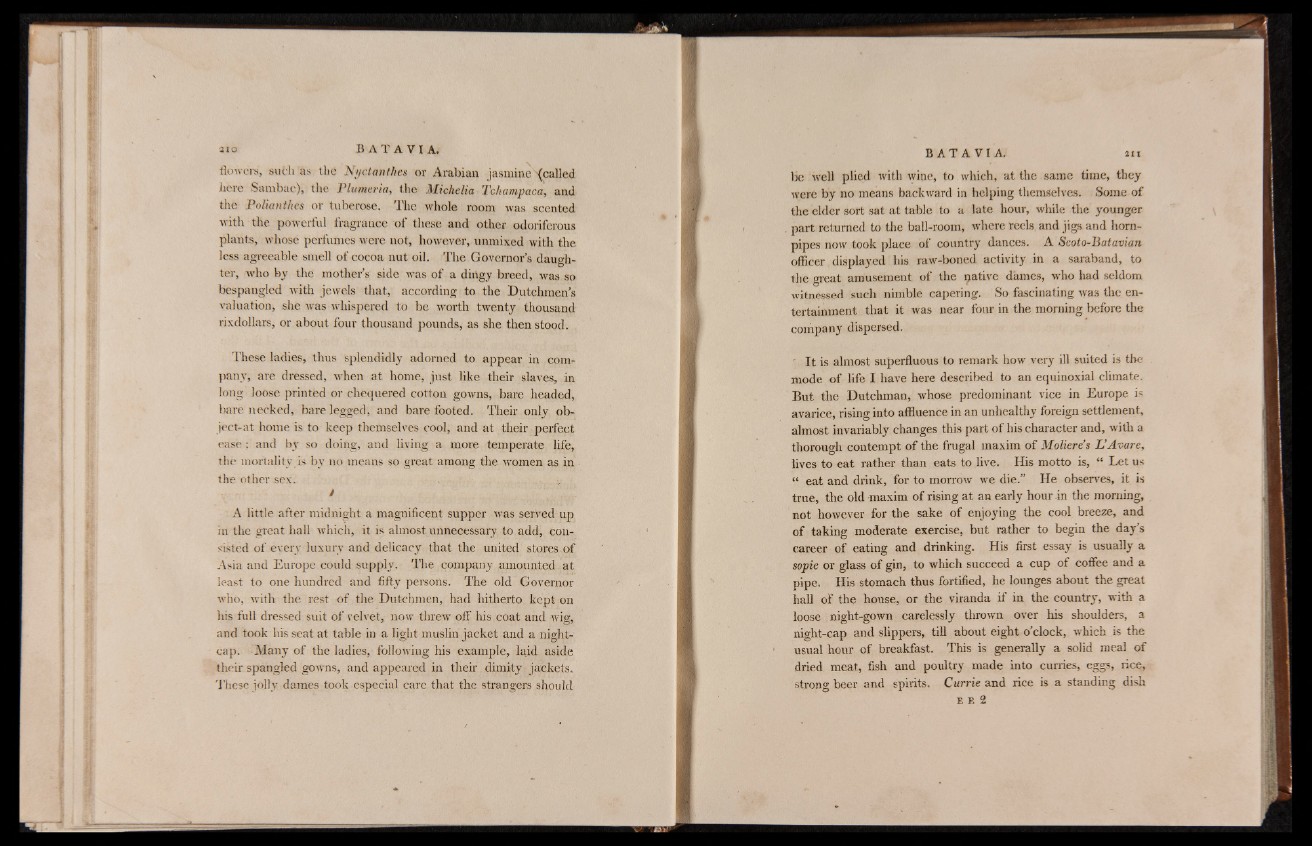
flowers, such as the Nyctanthes or Arabian jasmine '(called
here Sambae), the Plumería, the Michelia Tchampaca, and
the Polianthés or tuberose. The whole room was scented
with the powerful fragrance of these and other odoriferous
plants, whose perfumes were not, however, unmixed with the
less agreeable smell of cocoa nut oil. The Governor’s daughter,
who by the mother’s side was of a dingy breed, was so
bespangled with jewels that, according to the Dutchmen’s
valuation, she was whispered to be worth twenty thousand
rixdollars, or about four thousand pounds, as she then stood.
These ladies, thus splendidly adorned to appear in company,
are dressed, when at home, just like their slaves, in
long loose printed or chequered cotton gowns, bare headed,
bare necked, bare legged, and bare footed. Their only ob-
ject-at home is to keep themselves cool, and at their perfect
ease : and by so doing, and living a more temperate life,
the mortality is by no means so great among the women as in
the other sex. , . . ■ .
t
A little after midnight a magnificent supper was served up
in the great hall which, it is almost unnecessary to add, consisted
of every luxury and delicacy that the united stores of
Asia and Europe could supply. The company amounted at
least to one hundred and fifty persons. The old Governor
who, with the rest of the Dutchmen, had hitherto kept on
his full dressed suit of velvet, now threw off his coat and wig,
and took his seat at table in a light muslin jacket and a nightcap.
Many of the ladies, following his example, la.id aside
their spangled gowns, and appeared in their dimity jackets.
These jolly dames took especial care that the strangers should
be well plied with wine, to which, at the same time, they
were by no means backward in helping themselves. Some of
the elder sort sat at table to a late hour, while the younger
part returned to the ball-room, where reels and jigs and hornpipes
now took place of country dances. A Scoto-Batavian
officer displayed his raw-boned activity in a saraband, to
the great amusement of the pative dames, who had seldom
witnessed such nimble capering. So fascinating was the entertainment
that it was near four in the morning before the
company dispersed.
' I t is almost superfluous to remark how very ill suited is the
mode of life I have here described to an equinoxial climate.
But the Dutchman, whose predominant vice in Europe is
avarice, rising into affluence in an unhealthy foreign settlement,
almost invariably changes this part of his character and, with a
thorough contempt of the frugal maxim of Moliere’s L’Avare,
lives to eat rather than eats to live. His motto is, “ Let us
“ eat and drink, for to morrow we die.” He observes, it is
true, the old maxim of rising at an early hour in the morning,
not however for the sake of enjoying the cool breeze, and
of taking moderate exercise, but rather to begin the day’s
career of eating and drinking. His first essay is usually a
sopie or glass of gin, to which succeed a cup of coffee and a
pipe. His stomach thus fortified, he lounges about the great
hall of the house, or the viranda if in the country, with a
loose night-gown carelessly thrown over his shoulders, a
night-cap and slippers, till about eight o’clock, which is the
usual hour of breakfast. This is generally a solid meal of
dried meat, fish and poultry made into curries, eggs, rice,
strong beer and spirits. Currie and rice is a standing dish
e e 2